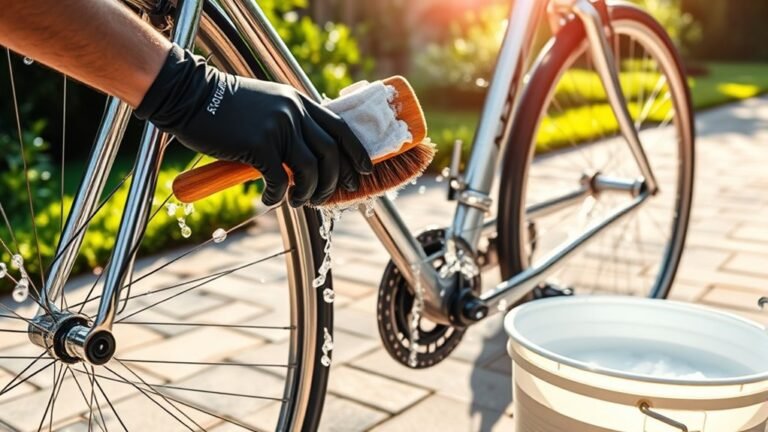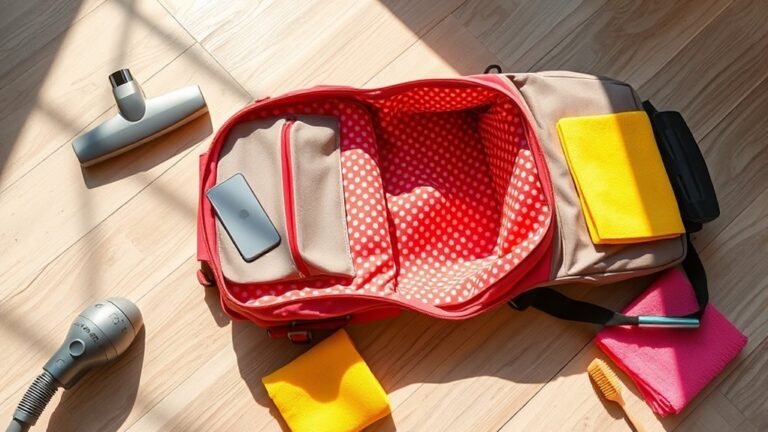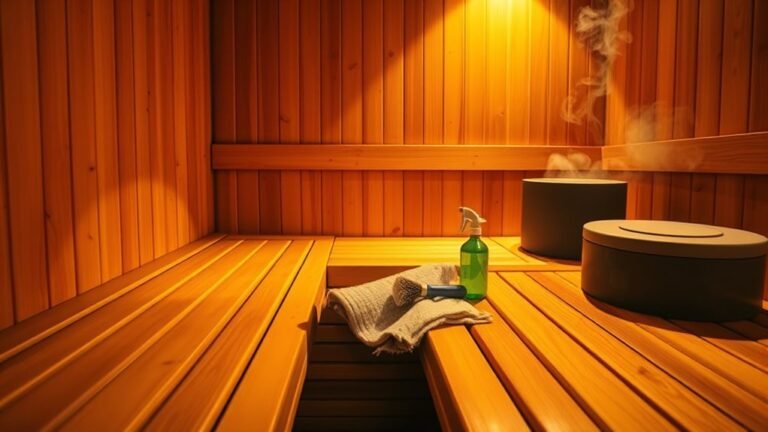The Environmental Impact of Common Cleaning Products
You might not realize it, but common cleaning products can harm water systems by releasing toxic chemicals that poison aquatic life and disrupt ecosystems. They also emit harmful VOCs indoors, affecting your air quality and health. Plus, their plastic packaging creates waste that stresses the environment. Choosing eco-friendly alternatives with natural ingredients and sustainable packaging can make a big difference. If you want to understand how your choices affect the planet and explore better options, there’s more to discover.
Chemicals in Cleaning Products and Their Effects on Water Systems

Although cleaning products help keep your home spotless, many contain chemicals that can harm water systems when washed down the drain. When you rinse these products away, chemical runoff enters rivers and lakes, disrupting natural ecosystems. You might not see the immediate damage, but over time, these substances cause aquatic toxicity, threatening fish, plants, and other wildlife. If you value freedom—not just in your life but for the environment—you’ll want to be mindful of what you use. Choosing eco-friendly or biodegradable cleaners helps reduce chemical runoff and protects water quality. By making conscious decisions, you can keep your home clean while safeguarding the freedom of nature’s water systems to thrive without toxic interference. Your choices truly make a difference in maintaining healthy, vibrant aquatic life.
Air Quality Concerns Linked to Household Cleaners
While chemical runoff affects water systems, the impact of household cleaners doesn’t stop there. When you use common cleaning products, you release volatile organic compounds (VOCs) into your home, turning your indoor air into a mix of pollutants. These indoor air pollutants can trigger headaches, respiratory issues, and even long-term health problems. Knowing which products emit the most VOCs helps you choose safer alternatives and breathe easier.
| Product Type | Common VOCs Released |
|---|---|
| Air Fresheners | Limonene, Formaldehyde |
| Disinfectants | Benzene, Toluene |
| All-Purpose Cleaners | Ethanol, Acetone |
| Floor Cleaners | Xylene, Glycol Ethers |
Taking control means opting for products with fewer VOCs, so your home stays a place of fresh air and freedom.
Impact on Wildlife and Ecosystems

Because cleaning products often contain harmful chemicals, their effects extend beyond your home, threatening wildlife and ecosystems. When you rinse these products down drains, chemical runoff can enter waterways, poisoning aquatic life and disrupting delicate food chains. This contamination alters water quality, making it harder for fish and amphibians to survive. On land, toxic residues contribute to habitat disruption, forcing animals to relocate or perish. You may not see it directly, but these impacts ripple through ecosystems, reducing biodiversity and resilience. Choosing eco-friendly alternatives helps protect natural habitats and the creatures that depend on them. By being mindful of what you use and how you dispose of it, you can preserve the freedom of wildlife to thrive and maintain the balance of the ecosystems we all share.
Waste and Packaging Issues in Cleaning Supplies
When you choose cleaning products, you might not think about the waste and packaging they create, but these factors have a big environmental impact. Most cleaning supplies come in plastic bottles, pumps, and boxes that add to packaging waste. Once you finish using them, disposing of these containers becomes a problem. Recycling challenges arise because many packaging materials are mixed or coated with substances that make them hard to recycle properly. This means a lot of packaging ends up in landfills or, worse, pollutes natural environments. If you want to protect your freedom to enjoy a clean planet, it’s important to be aware of how your choices contribute to this issue. Being mindful helps reduce waste and supports more responsible use of packaging.
Sustainable Alternatives for Eco-Friendly Cleaning

Packaging waste from cleaning products can feel overwhelming, but there are better options that help reduce your environmental footprint. You don’t have to settle for harsh chemicals or excessive plastic when you can choose products made from biodegradable materials. These break down naturally, sparing landfills and waterways from lasting damage. Opting for cleaners with natural ingredients means you’re using substances that are safer for both you and the planet. Plus, many sustainable brands offer refillable containers or concentrate formulas, giving you freedom from single-use plastics. By making these mindful choices, you not only protect the environment but also embrace a lifestyle that values responsibility and independence. It’s about cleaning smartly—without compromising your values or the earth’s health.
Frequently Asked Questions
How Do Cleaning Products Affect Indoor Allergens and Mold Growth?
When you use cleaning products, you’re actively working on allergen reduction by removing dust, pet dander, and other irritants that trigger allergies. You’ll also help with mold prevention by targeting damp areas where mold thrives. Choosing the right products lets you keep your space fresh and free from harmful substances, so you can enjoy your home without worrying about allergens or mold taking over your freedom to breathe easy.
Are Natural Essential Oils Safe to Use in Cleaning Products?
Imagine you’re freshening up your home with lemon essential oil—it smells great and naturally fights germs. Essential oil benefits include antibacterial properties and a pleasant scent, making natural cleaning effective and enjoyable. However, you’ve got to use them properly; some oils can irritate skin or pets. So, you’re free to switch to natural cleaning, but always dilute oils and check safety guidelines to keep your space safe and fresh.
Can Cleaning Products Contribute to Antibiotic Resistance?
Yes, disinfectant overuse can lead to microbial resistance, which means bacteria become tougher to kill. When you rely too much on harsh cleaning products, you might unintentionally help germs adapt and survive. This resistance can make infections harder to treat, limiting your freedom to stay healthy without stronger antibiotics. So, it’s smart to use cleaning products wisely and not overdo it, helping keep your environment and your health safer.
How Do Cleaning Habits Vary Globally in Environmental Impact?
You might think everyone cleans the same way, but cultural differences actually shape habits worldwide, affecting the environment differently. In some places, people use harsh chemicals without much consumer awareness, increasing pollution. Elsewhere, folks prefer eco-friendly options, reducing harm. Understanding these variations helps you make freer, informed choices that align with your values. So, by learning about global habits, you can better decide how your cleaning impacts the planet.
What Regulations Govern the Labeling of Eco-Friendly Cleaning Products?
When you’re choosing eco-friendly cleaning products, it’s important to know that labeling requirements vary by region but generally aim to guarantee transparency. Green certifications like EPA’s Safer Choice or EU Ecolabel help you identify genuinely sustainable options. These regulations give you the freedom to make informed choices without being misled by vague claims. So, by checking for recognized labels, you’re protecting your right to select products that truly respect the environment.






